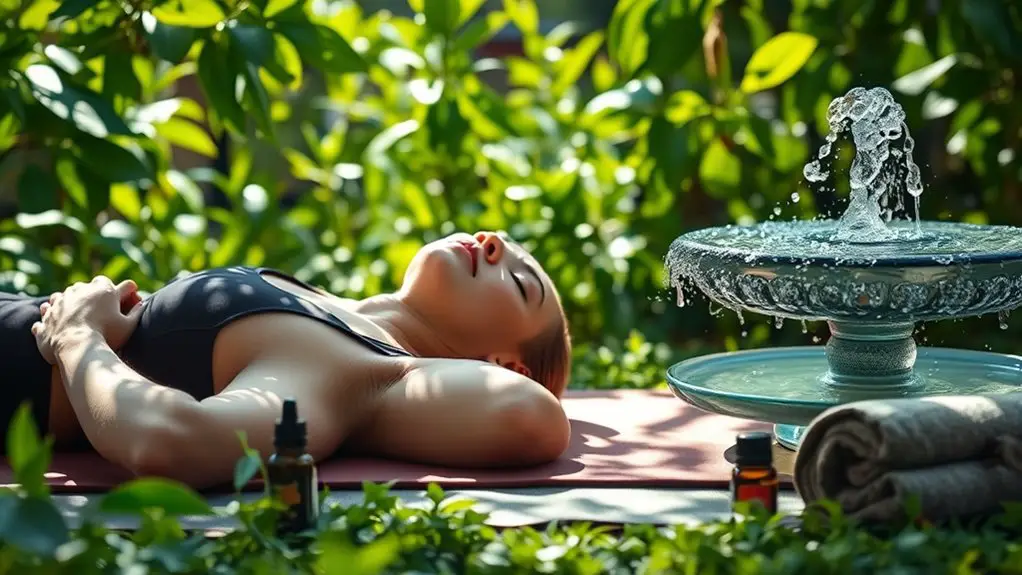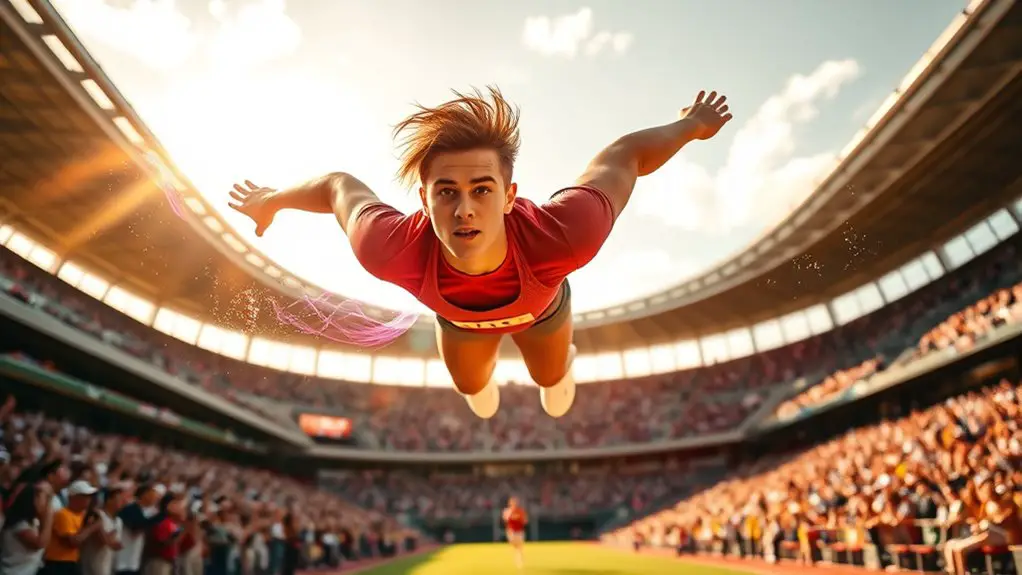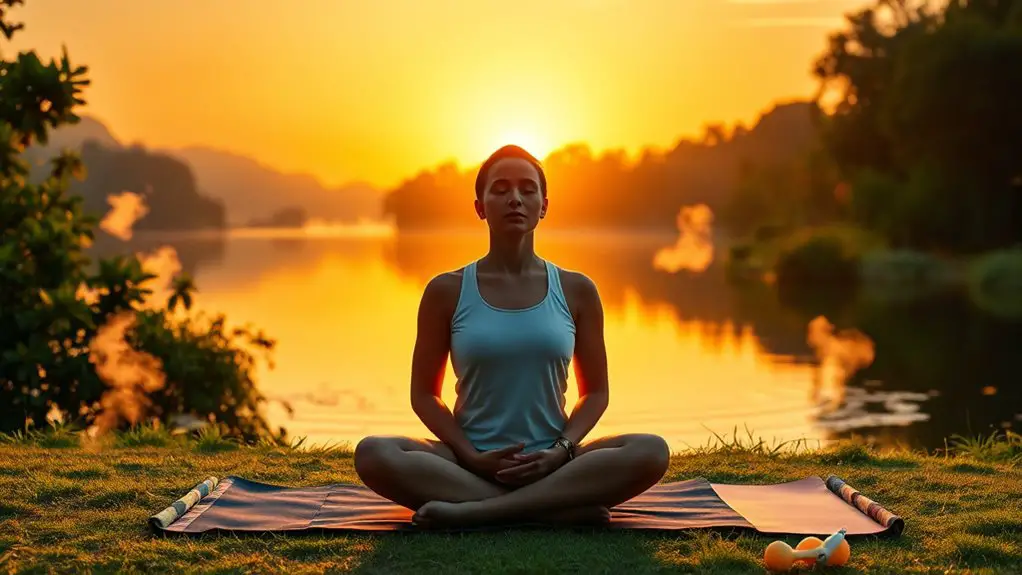To improve your performance and reduce stress, try incorporating relaxation techniques like deep breathing exercises, progressive muscle relaxation, and mindfulness meditation. These methods help you focus, ease tension, and enhance your mental clarity. Additionally, yoga and stretching can boost flexibility, while visualization techniques prepare your mind for success. Implementing good sleep hygiene also aids in recovery. Want to discover more ways to boost your relaxation and performance? Keep exploring!
Deep Breathing Exercises
When you're feeling the pressure before a big game, deep breathing exercises can help calm your nerves and enhance your focus. By taking a moment to center yourself, you'll free your mind from distractions. Start by inhaling deeply through your nose, allowing your diaphragm to expand fully. Hold that breath for a few seconds, then exhale slowly through your mouth. This simple practice can ground you, bringing clarity to your thoughts and energy to your body. You'll notice a shift as your heart rate slows and your tension eases. Incorporating deep breathing into your pre-game routine gives you the freedom to embrace the moment, letting go of anxiety and inviting confidence. Remember, each breath is a step toward your best performance.
Progressive Muscle Relaxation
After mastering deep breathing, you can further enhance your relaxation with Progressive Muscle Relaxation (PMR). This technique involves systematically tensing and then relaxing different muscle groups, helping you release built-up tension. Start by finding a comfortable position, whether sitting or lying down. Focus on your feet first; tense the muscles for a few seconds, then let go completely. Gradually work your way up through your legs, abdomen, arms, and face. As you relax each group, notice the contrast between tension and relaxation. PMR not only calms your body but also sharpens your mind, allowing you to feel more in control. Embrace this practice, and you'll discover a newfound sense of freedom in your athletic performance.
Mindfulness and Meditation
Many athletes find that incorporating mindfulness and meditation into their routine can considerably enhance their focus and performance. By taking just a few minutes each day to practice being present, you can create mental space that fosters clarity and reduces anxiety. This isn't about shutting out thoughts; it's about observing them without judgment. As you learn to focus on your breath or a specific mantra, you'll notice an increased ability to stay calm under pressure. This newfound awareness extends beyond your practice, helping you navigate challenges in and out of competition. Embracing mindfulness allows you to connect deeply with your body and mind, freeing you to release your full potential when it matters most. Give it a try—your performance may thank you!
Yoga and Stretching
Incorporating yoga and stretching into your training routine can considerably improve your flexibility, strength, and overall performance. These practices help release tension in your muscles, allowing you to move more freely and efficiently. By focusing on your breath and body awareness, you can enhance your mind-body connection, making your workouts more effective.
Yoga promotes balance and stability, which are essential for any athlete looking to elevate their game. Stretching, on the other hand, increases your range of motion, reducing the risk of injury. Both activities foster relaxation, helping you unwind after intense training sessions. So, make time for yoga and stretching; your body will thank you by performing at its best and giving you that much-desired sense of freedom.
Visualization Techniques
While yoga and stretching help prepare your body for physical activity, visualization techniques can enhance your mental preparedness. By visualizing success, you tap into your mind's power to create a vivid image of achieving your goals. Picture yourself crossing the finish line or executing a perfect routine. This mental rehearsal not only boosts your confidence but also helps reduce anxiety.
To practice, find a quiet space, close your eyes, and breathe deeply. Imagine every detail—the sounds, the feelings, and the sights. The more real it feels, the better. Consistent visualization can transform your mindset, allowing you to embrace challenges with a sense of freedom. So, let your imagination run wild and release your full potential as you prepare for your next performance.
Massage Therapy
Massage therapy can be a game-changer for athletes looking to enhance their recovery and performance. It helps release tension, improve circulation, and promote relaxation, making it easier for you to bounce back after intense training sessions. Regular massages can target specific muscle groups, reducing soreness and preventing injuries. You'll feel more flexible and agile, allowing you to push your limits without fear. Plus, the mental break massage provides can help clear your mind, giving you a fresh perspective on your goals. Whether you opt for deep tissue, sports massage, or trigger point therapy, you'll discover the freedom to move better and feel rejuvenated. So, treat yourself to a massage and unveil your full athletic potential!
Sleep Hygiene and Recovery
Quality sleep is essential for athletes aiming to optimize their recovery and performance. To achieve this, you need to establish a consistent sleep schedule. Going to bed and waking up at the same time helps regulate your body's internal clock, making it easier to fall asleep and wake up refreshed.
Creating a relaxing bedtime routine can also work wonders. Consider winding down with gentle stretches, deep breathing, or reading. Your sleep environment matters too; keep your bedroom dark, quiet, and cool. Limit screen time before bed, as blue light can disrupt melatonin production.
Lastly, be mindful of your diet. Avoid heavy meals and caffeine close to bedtime. Prioritizing sleep hygiene not only enhances recovery but also empowers you to perform at your best.
Frequently Asked Questions
How Often Should Athletes Practice Relaxation Techniques?
You should practice relaxation techniques regularly, ideally daily or several times a week. Consistency helps you manage stress and enhances your performance. Find a routine that fits your lifestyle, and you'll feel the benefits.
Can Relaxation Techniques Improve Athletic Performance Directly?
Imagine your mind as a calm lake, reflecting clarity. Relaxation techniques can indeed enhance your performance; they help you focus, reduce anxiety, and boost recovery. So, why not embrace them for that extra edge?
What Are the Best Times to Use Relaxation Techniques?
The best times to use relaxation techniques are before a challenging event, after intense workouts, or during stressful moments. You'll find they help you regain focus, reduce tension, and enhance your overall well-being.
Are There Relaxation Techniques Specifically for Pre-Competition Anxiety?
When nerves feel like a thousand buzzing bees in your stomach, you can use deep breathing, visualization, or progressive muscle relaxation to ease pre-competition anxiety. These techniques can help you find your calm before the storm.
How Do Relaxation Techniques Benefit Mental Health in Athletes?
Relaxation techniques can greatly improve your mental health by reducing stress, enhancing focus, and promoting emotional balance. When you practice these methods, you're likely to experience increased confidence and overall well-being, empowering you to perform better.




